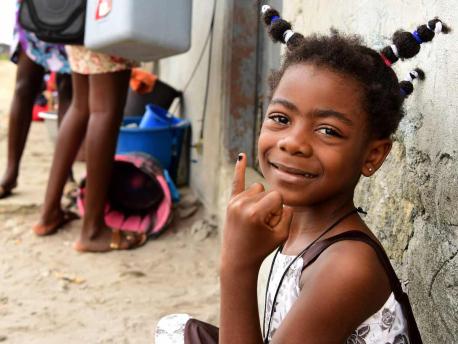
Unsung Heroes: Vaccinators Climb Mountains to Save Children's Lives
In the face of Yemen's crumbling health system, mobile vaccination teams are reaching children with lifesaving health services.
Vaccinating children against life-threatening diseases in the middle of the world's worst humanitarian crisis is no small feat. In Yemen, where civil war has raged since 2015, the nation's health system is on the verge of collapse. Half the health centers are closed and hospitals remain severely overcrowded. More than 11 million children now need humanitarian aid and protection — nearly every child in Yemen.
In August, a nationwide polio vaccination campaign reached 4,163,322 children with oral polio vaccine. Polio vaccinators in the chronically underdeveloped country brave rough terrains and cross hostile frontlines, crisscrossing valleys and mountains to reach children, many of whom have been displaced by the conflict. Their work has been challenged by violence, roadblocks, fuel shortages and power outages, among other obstacles.
In August, a nationwide polio vaccination campaign reached 4,163,322 children in Yemen with oral polio vaccine
In 2017, 40,000 vaccinators spread across the conflict-ridden nation to vaccinate 5.3 million children under the age of five in a door-to-door campaign against polio. Ahmed Ahmed Abdullah is one of these vaccinators. On a typical day, he set off with three colleagues to vaccinate children in the village of Al’anaf, about 43 miles north of the capital city, Sana’a.
Al’anaf is located behind a rugged mountain with no road or path leading to it. Ahmed and his colleagues had to climb the mountain in sweltering heat before descending, hearts pounding from exhaustion, to the village below.
A donkey carries the gas cylinder that powers the generator that keeps the vaccines cold
An invaluable fifth member of Ahmed’s team is a donkey. This sturdy, resilient animal carries the all-important gas cylinder that is used to power the generator that keeps the vaccine container cold. This prevents the vaccines from degrading. Ever since the conflict in Yemen escalated, the country has had limited electricity and erratic fuel supply.
Alerted by radio announcements, children and their families wait anxiously for the vaccination team to arrive. The health workers move from house to house, writing down the number of children living in each. "If a house has no children, we write that down too, even if it's locked," says Ahmed.
Reaching the unreachable
Despite their fatigue, the team immediately begin administering the polio vaccine. Each child under the age of 5 receives two drops in the mouth. Children aged 6 to 11 months are also given Vitamin A supplements to help boost their immunity.
“This vaccine will protect your child from polio,” Ahmed tells the parents, holding the vial in his hand. “If your child gets polio and becomes disabled, the whole family will suffer because you have to take care of the child and carry him everywhere, even to the toilet.”
Vaccination teams trek to Yemen's most isolated villages to reach every child
According to Ahmed, his team cover around 20 to 30 households each day over the course of a three-day campaign. After a child is vaccinated, his or her index finger is marked, and the house is marked as well, to make sure that no child is missed. The house marking also helps the team to know where they ended the previous day, and where to begin from the following day.
“We need to vaccinate our children because they are a part of us,” Ahmed says, “We will not leave out even a single child.”

A child receives a dose of the oral polio vaccine during a nationwide immunization campaign in Amran Governate, Yemen. © UNICEF/UN0143436/Alsamai
UNICEF and partners have scaled up support for children in Yemen, providing vaccines, medicines and humanitarian assistance
The campaign comes at a critical time when the population, particularly children, are extremely vulnerable. With children in Yemen living on the brink of famine and malnutrition widespread, children face an extremely high risk of disease.
UNICEF, working with partners and health authorities, has scaled up support for children in Yemen, providing vaccines and medicines for treating common childhood illnesses such as diarrhea and respiratory tract infections.
Photo at top: Health workers and volunteers make their way to deliver polio vaccines to the remote village of Bani Mansour, Alhaymah, Yemen in February 2017. More than 40,000 health workers took part in the three-day polio immunization campaign. © UNICEF/UN057310/Al-Zikri
HOW TO HELP
There are many ways to make a difference
War, famine, poverty, natural disasters — threats to the world's children keep coming. But UNICEF won't stop working to keep children healthy and safe.
UNICEF works in over 190 countries and territories — more places than any other children's organization. UNICEF has the world's largest humanitarian warehouse and, when disaster strikes, can get supplies almost anywhere within 72 hours. Constantly innovating, always advocating for a better world for children, UNICEF works to ensure that every child can grow up healthy, educated, protected and respected.
Would you like to help give all children the opportunity to reach their full potential? There are many ways to get involved.




